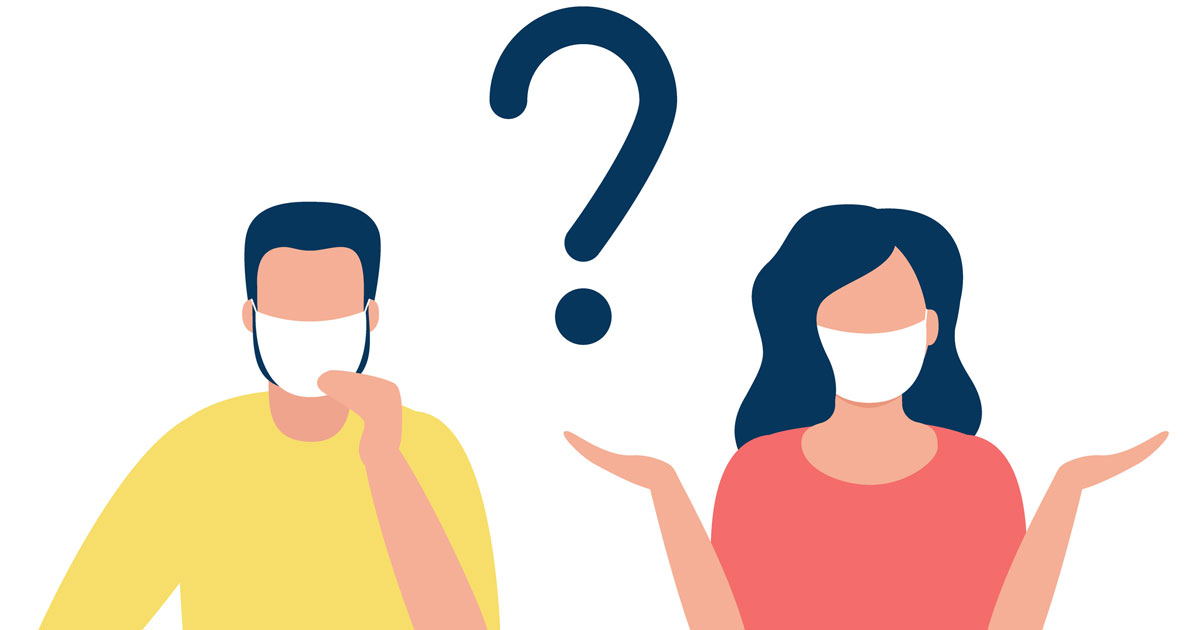14 COVID-19 testing questions you've asked us

Feeling a bit off and wondering if you should get a COVID-19 test? But what do you do? There are several options – such as mobile apps, drive-thru testing, or a trip to your doctor's office.
Paul Fey, PhD, who oversees nasal swab testing for Nebraska Medicine, shares answers to commonly asked anonymous questions below.
If you have questions about your unique situation, please schedule an appointment with your primary care provider. We can't provide medical advice regarding a person's medical conditions through anonymous questions.
1. Who should be tested?
Anyone who has exposure to a positive COVID-19 case should seek testing. Exposure is defined as: Contact with a COVID-19 case (someone who tested positive) when they're most likely to be contagious (10 days from onset of their symptoms) where contact is:
- Within 6 feet
- Longer than 15 minutes
- No use of mask
If you meet two out of the three criteria – like brief unmasked contact (less than 15 minutes) with a positive case – you can be tested if you wish.
If you're wondering whether you should seek a test, use the 1-Check COVID app on Android or iOS.
2. Can asymptomatic people get tested by Nebraska Medicine?
With a limited number of tests, we are focusing on testing people with symptoms. The emphasis on testing of symptomatic people is designed to find the infected people and the contacts of infected people and reduce the spread of disease.
COVID-19 symptoms include:
- Fever (≥100.0F)/chills
- Cough
- Shortness of breath/difficulty breathing
- Sore throat
- Nasal congestion/runny nose
- Nausea/vomiting
- Diarrhea
- Headaches
- Muscle or body aches
- Fatigue
- Unexplained loss of sense of smell and/or taste
However, at times, physicians will offer testing for people who have been exposed, generally four to five days after the exposure.
3. Does turnaround time depend on where you are tested?
Turnaround time isn't a competition – everyone is doing their best with staff and lab space limitations. Turnaround time at our hospital is determined by the need of the patient and the physicians. If there isn't an urgent need for testing, our routine turnaround time is 24 to 48 hours. If the condition requires a rapid test result, we can provide the information quickly (within a day).
4. Alaska requires a negative COVID-19 test 72 hours before landing. Is it possible for us to get the test and the results before 72 hours?
Yes, the routine turnaround time for Nebraska Medicine has almost always been inside of 72 hours.
5. How fast can a health care provider get test results back if they were tested for COVID-19?
We provide test results depending on the need of the situation, not their job category.
6. Can a group of people get tested all at once, especially ahead of traveling together? If yes, what's the process for that?
Yes, people can appear as a group at the specimen collection site and be tested together.
7. After a person tests positive, when should they retest? If they test positive again, then what should they do?
You should self-quarantine and monitor symptoms for 10 days after your first positive test. Most physicians do not recommend a second test after you've recovered and don't have symptoms.
8. If someone had a positive result, no symptoms, how should they handle life?
If you've had a positive test, yet remain asymptomatic, you should avoid being around others. Self-isolate for 10 days after the date you tested positive. Don't leave your home unless you need urgent medical care. If possible, stay in a separate room and use a separate bathroom from healthy people.
If you develop symptoms, wait 10 days after the day your symptoms appeared to be with others.
9. How long can I test positive even after fully recovering and no longer have symptoms?
We have experience with people who test positive a week or more after the first test.
10. Does Nebraska Medicine charge for nasal swab testing? Does insurance cover nasal swab testing?
Yes, Nebraska Medicine charges for the test, and yes, it is usually covered by insurance.
11. If we get a COVID-19 test, do our names get saved forever in a state or national database (even if we test negative)?
We are required to submit COVID-19 test results to the State of Nebraska Health Department. We don't know how long they keep the data.
12. If a person self-quarantines for 14 days after visiting a hot spot and remains asymptomatic, should they be tested?
Testing is not required.
13. Does testing require a doctor's note?
A COVID-19 test can be performed without a physician's order. If you are seen in a clinic, it is the best practice of medicine for the physician to document the visit. If you're seen at a Nebraska Medicine location, you'll get a doctor's note that recommends you stay home for 10 days.
14. If person A has COVID-19, and I haven't been around person A, but I've been around person B and C who have been around person A, do I need to get tested?
No. If you haven't had an exposure with someone who has COVID-19, you don't need a test. Exposure means:
- Within 6 feet
- Longer than 15 minutes
- No use of mask
Monitor yourself for symptoms. If you develop COVID-19 symptoms, get a test.
The questions above relate to nasal swab (PCR) testing. Nasal swab testing determines whether someone is actively infected with COVID-19. If you have questions about antibody testing, read these 9 answers to commonly asked questions.



